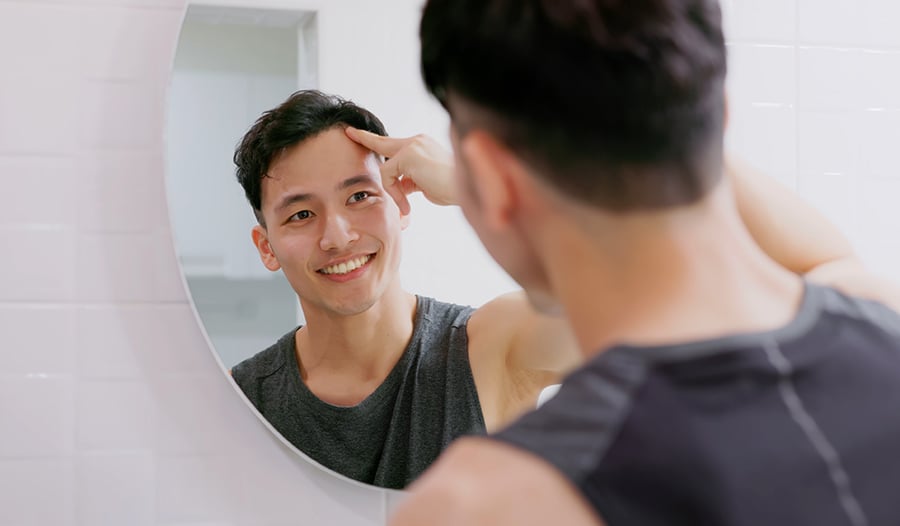9 Proven Natural Remedies for Hair Loss
DISCLAIMER:This blog does not intend to provide diagnosis...
- In this article:
- What Causes Hair Loss?
- Can You Stop Hair Loss Naturally?
- 9 Natural Remedies For Hair Loss
- Key Takeaways

Nutrient deficiencies, hormone imbalances, sluggish digestion, and poor dietary choices are all factors that can impact the health of hair follicles and lead to hair loss or thinning hair.
Learn what causes hair shedding and discover nine proven natural remedies for hair loss.
What Causes Hair Loss?
While it's normal to lose hair as part of the natural hair-shedding process, excessive hair loss can be a sign of underlying health issues or may be linked to dietary and lifestyle habits.
Healthy hair requires various vitamins, minerals, and fatty acids to grow. Research[1] published in Dermatology and Therapy suggests that nutrient deficiencies are a common cause of hair shedding, thinning, and hair loss.
The hair growth cycle is influenced by several hormones, including estrogen and testosterone, and hormone imbalances can play a significant role in androgenetic alopecia, also known as male and female pattern hair loss.
Chronic stress is linked to elevated levels of cortisol, a stress hormone that can negatively impact hair follicle function and restrict blood flow to the scalp, which can cause brittle and easily damaged hair prone to shedding.
In addition, evidence[2] published in the Cosmetics Journal found that inflammation plays a critical role in hair loss and suggests proinflammatory molecules can interfere with the growth phase of hair follicles. This can trigger hair shedding and result in poor hair regrowth.
Factors that can contribute to chronic inflammation include:
- Excessive body fat
- Chronic stress
- Regular consumption of refined carbs, sugars, and processed foods
- Lack of physical exercise
- Smoking and alcohol intake
- Poor sleep
Can You Stop Hair Loss Naturally?
Yes, in some cases, it's possible to stop hair loss and regrow hair naturally using simple but effective natural remedies.
While the best approach to stopping hair loss depends on the underlying cause, making beneficial dietary changes, maintaining optimal nutrient stores, avoiding harsh hair care products, and supporting a healthy scalp are excellent strategies to stimulate new hair growth.
However, sudden and severe hair shedding can indicate a more serious medical condition. It’s crucial to consult a healthcare professional for a thorough health evaluation if you are concerned about hair loss.
9 Natural Remedies For Hair Loss
Hair loss can present a significant personal and physiological burden, affecting self-esteem and confidence. Fortunately, various remedies can help prevent and even reverse hair loss.
Here are nine proven natural remedies to stop hair loss and promote strong hair growth.
1. Maintain optimal vitamin D levels
Maintaining optimal levels of vitamin D can promote healthy hair growth and lower the risk of male pattern baldness and alopecia areata, an autoimmune condition characterized by partial or complete loss of body hair.
Vitamin D deficiency is widespread, which may explain why almost 80 million U.S. adults are experiencing some form of hair loss.
Evidence[3] published in Dermatology Online suggests that vitamin D’s hair growth-promoting effects are linked to its ability to stimulate normal hair follicle cycling and help lower inflammation, which are crucial aspects for scalp and hair health.
Factors such as age, geographical location, and skin tone can impact vitamin D production and contribute to vitamin D deficiency despite adequate sunlight exposure.
Taking a vitamin D3 supplement is a convenient and effective strategy to maintain optimal vitamin D stores and stimulate hair growth.
2. Eat more seafood
Seafood, including shrimp, mussels, clams, and oily fish such as salmon, mackerel, and trout are rich sources of omega-3 fats.
These essential fatty acids are vital to maintaining the scalp's natural oil barrier, which retains moisture and helps prevent scalp irritation linked to hair breakage and loss.
A study[4] published in the Journal of Cosmetic Dermatology investigating the benefits of omega-3 fats for treating hair loss found that women who took an omega-3 fatty acid supplement for six months experienced significantly less hair loss, increased hair thickness, and improved hair density.
3. Regular scalp massages
Promoting scalp health is critical to prevent premature hair loss and support natural hair regrowth.
Scalp massages increase blood flow, delivering oxygen and essential nutrients that support hair follicle function and hair growth.
Better circulation also helps remove toxins and waste products from the scalp, making regular scalp massages one of the most effective natural methods to promote regrowth.
Adding a few drops of essential oils or coconut oil to the scalp can help reduce dryness and irritation, maximizing the benefits of scalp massages for hair growth.
These oils have potential hair-health-promoting benefits:
Research[5] published in SkinMed found rosemary oil more effective in treating female and male pattern baldness than minoxidil, a popular prescription drug used as a topical treatment for hair loss.
4. Aloe vera hair mask
Applying pure aloe vera gel to the scalp and hair can promote regrowth and help with hair loss.
Aloe vera gel contains essential nutrients, including vitamins C and E, minerals, and amino acids that nourish hair follicles, strengthen the hair shaft, and improve the overall condition of the scalp and hair.
5. Take a trace mineral complex
Trace mineral complexes have long been known to be a natural hair growth supplement.
Trace minerals are essential in maintaining the strength, growth, and appearance of hair, and mineral deficiencies have been linked to an increased risk of patchy hair loss, balding, and a receding hairline.
While trace minerals such as zinc, copper, selenium, and manganese are all critical for hair follicle function, iron appears to be of particular importance for healthy hair.
A study[6] published in Skin Appendage Disorders found that almost 50 percent of women with hair loss have low iron levels, suggesting that iron supplementation may be an effective therapeutic strategy to prevent and reverse hair loss.
Iron facilitates blood circulation throughout the body, ensuring that hair follicles are oxygenated and receive nutrients.
6. Use biotin shampoo
Using the wrong haircare products can exacerbate scalp issues and worsen hair loss.
Many shampoos contain harsh chemicals that strip natural oils from the scalp, which can cause brittle hair that's hard to manage and potentially worsens hair loss.
Biotin is needed to produce keratin, a protein that provides structural integrity to hair shafts, making hair stronger and less prone to breakage. Using a biotin shampoo helps deliver biotin directly to the scalp, supporting the growth of strong, thick hair.
Alternatively, biotin supplements have been found effective in supporting healthy hair, and research[7] published in The Journal of Clinical and Aesthetic Dermatology found that biotin supplementation helps improve hair thinning and promotes significant hair growth.
7. Promote microbial gut diversity
The link between a diverse gut microbiome and hair health is often overlooked.
However, beneficial gut bacteria enhance the intestinal absorption of nutrients, including vitamins, minerals, and amino acids essential for healthy hair growth.
Evidence[8] published in PLOS ONE found that a diverse microbiome supports hormonal balance and may help reduce hormone levels related to inflammation and stress, which can impact hair growth.
Consuming plenty of fermented foods such as sauerkraut, kimchi, and miso is an excellent strategy to maintain a healthy gut microbiome.
Probiotic supplements are a great alternative for those who may not consume enough probiotic-rich foods due to taste preferences or specific health concerns.
8. Red ginseng extract
Red ginseng extract is a popular natural remedy that may help boost hair growth.
A clinical study[9] published in the International Journal of Molecular Science found that red ginseng can regulate the activity of various proteins involved in hair-cycling phases and may be an effective non-pharmaceutical remedy to prevent hair loss and promote hair growth.
9. Avoid refined carbohydrates and sugars
A diet high in carbs and sugars can lead to spikes in blood sugar and insulin levels, which can contribute to insulin resistance.
Insulin resistance is associated with inflammation and hormonal imbalances that can negatively affect hair follicles and lead to hair loss.
Avoiding or minimizing sugar and carbohydrate intake promotes metabolic health and can help prevent insulin resistance, thereby minimizing the risk of inflammation and hormonal issues that could trigger or exacerbate hair shedding.
Key Takeaways
A receding hairline, patchy hair loss, or thinning hair can have various underlying causes but is often linked to nutrient deficiencies, inflammation, using the wrong hair care products, or hormone imbalances.
Fortunately, there are many proven natural remedies for hair loss, including scalp massages, trace mineral and vitamin D supplementation, aloe vera hair masks, and red ginseng extract.
In addition, promoting a diverse gut microbiome with probiotics, eating plenty of omega-3-rich seafood, and avoiding refined carbs and sugars can promote hormonal balance, lower inflammation, and support healthy hair growth.
References:
- Almohanna HM, Ahmed AA, Tsatalis JP, Tosti A. The Role of Vitamins and Minerals in Hair Loss: A Review. Dermatology and therapy. 2019;9(1):51-70. doi:https://doi.org/10.1007/s13555-018-0278-6
- Sadgrove N, Batra S, Barreto D, Rapaport J. An Updated Etiology of Hair Loss and the New Cosmeceutical Paradigm in Therapy: Clearing “the Big Eight Strikes.” Cosmetics. 2023;10(4):106. doi:https://doi.org/10.3390/cosmetics10040106
- Amor KT, Rashid RM, Mirmirani P. Does D matter? The role of vitamin D in hair disorders and hair follicle cycling. Dermatology Online Journal. 2010;16(2):3. https://pubmed.ncbi.nlm.nih.gov/20178699/
- Le Floc’h C, Cheniti A, Connétable S, Piccardi N, Vincenzi C, Tosti A. Effect of a nutritional supplement on hair loss in women. Journal of Cosmetic Dermatology. 2015;14(1):76-82. doi:https://doi.org/10.1111/jocd.12127
- Panahi Y, Taghizadeh M, Marzony ET, Sahebkar A. Rosemary oil vs minoxidil 2% for the treatment of androgenetic alopecia: a randomized comparative trial. Skinmed. 2015;13(1):15-21. https://pubmed.ncbi.nlm.nih.gov/25842469/
- Treister-Goltzman Y, Yarza S, Peleg R. Iron Deficiency and Nonscarring Alopecia in Women: Systematic Review and Meta-Analysis. Skin Appendage Disorders. 2021;8(2):83-92. doi:https://doi.org/10.1159/000519952
- Glynis A. A Double-blind, Placebo-controlled Study Evaluating the Efficacy of an Oral Supplement in Women with Self-perceived Thinning Hair. The Journal of Clinical and Aesthetic Dermatology. 2012;5(11):28-34. https://www.ncbi.nlm.nih.gov/pmc/articles/PMC3509882/
- Zou S, Yang X, Li N, Wang H, Gui J, Li J. Association of probiotic ingestion with serum sex steroid hormones among pre- and postmenopausal women from the NHANES, 2013–2016. PLOS ONE. 2023;18(11):e0294436-e0294436. doi:https://doi.org/10.1371/journal.pone.0294436
- Choi B. Hair-Growth Potential of Ginseng and Its Major Metabolites: A Review on Its Molecular Mechanisms. International Journal of Molecular Sciences. 2018;19(9):2703. doi:https://doi.org/10.3390/ijms19092703
- Optimize Your Microbiome: Enhance Gut Microbes Diversity. www.drberg.com. Accessed April 18, 2024. https://www.drberg.com/blog/the-secret-to-increasing-the-diversity-of-gut-microbes

 By Dr. Brad Stanfield, M.D.
By Dr. Brad Stanfield, M.D.


